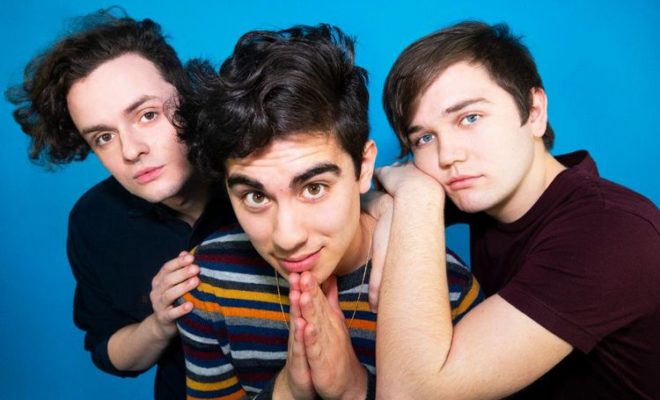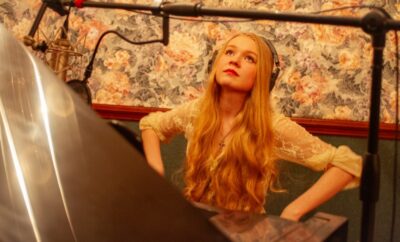
Interviews
The Happy Fits – What Could Be Better
By: Courtney Grooms
Q) How would you describe your sound?
A) We grew up listening to indie rock of the 2000’s; The Strokes, The Killers, Two Door Cinema Club, Alabama Shakes, Airborne Toxic Event, Shannon and The Clams, Franz Ferdinand, The Fratellis and Bombay Bicycle Club. We also have an affinity for classic rock like The Beatles, Fleetwood Mac and The Mamas and The Papas. We love writing songs with catchy melodies and belted choruses. Since we use a cello instead of bass in the low end for most of the songs, it gives our music a bit of a modern-Lumineers feel, but the guitar and drums we usually aim for classic indie and rock sounds.
Q) What is your creative process like?
A) We always start with melody first. Unless the melody is unique and memorable, it’s really hard for us to tap in to the emotion of the lyrics. Melodies usually pop in to my head when I’m about to go to sleep or when I’m driving; always at the most random times. I’d say I filter out around 99% of the melodies that pop in to my head. I actually wrote a demo called “Mind Radio” a while back about how the creative process is so random; sometimes it does feel like there’s a radio in my head just switching back and forth between different melodic channels.
After I get solid melodies and chords, I’ll move on to the lyrics. Every melody has a different emotional pull and I try to see what emotional aspect of my life will fit it best. Our newest song “Moving,” I had the melody in my head for the chorus since high school. It wasn’t until last November when I was going through a tumultuous, emotional stint with my parents that I felt like I had the words to match the melody and make it sound authentic to how I actually felt.
From there, we usually demo the track on Logic, though I’ve been trying to move to Pro Tools. We have a nice home studio set up at Ross’ house and we’ll usually record all the instruments there and then throw on a few fun reverb, delay, and distortion effects. Sometimes we just use Logic’s midi drums in the demos.
For the past two albums, we’ve taken our demos and then done another round of refinements with our producer and manager Ayad al Adhamy. Ayad has so much production experience and mixing knowledge that we trust him to guide us in making final decisions in our songs. For our newest album, we spent around six weeks recording in his Diamond City Studio in Greenpoint, Brooklyn. We started by recording all the drums, then layered guitar, then cello and then vocals and background vocals. We usually worked from 12PM-4AM most days.
Q) You always release such upbeat and positive songs and with Happy being in your band name, was your intention always to release these types of songs?
A) I’d definitely say the music we make is a reflection of our personalities. We are very positive people, but we still struggle with the same anxieties and daily-life stresses that everyone else does. We wanted our name to be associated with happiness so when people heard it, they would feel something positive and the music just naturally followed suit.
Q) What was the inspiration behind your new album’s first single “Go Dumb?”
A) I grew up in the classical music community and my family also put a very heavy emphasis on education. I did almost over a decade music lessons and classes, but I never felt like I was doing what I wanted to do which was create and write music. There was a heavy emphasis on practicing and analyzing other people’s music and it definitely allowed me to be fluent with the musical language. Except for my penultimate cello teach Carrie Stinson, I was never asked to explore my creative side. I received some criticism from my family as well as my classical peers for dropping out of music school to write pop music. Since the decision was frowned upon by a significant amount of my network, there was a point in time of my life where I viewed pursuing my passion of writing music as inferior. I wrote the lyrics for the song to be like a big jeer to my past; I love creating music and will gladly “Go Dumb” to do what I love.
Q) There will be a lot of people listening to “Go Dumb” who can probably relate to wanting to take a more creative route in life rather than academic. What advice would you give would you give for someone who is struggling between doing something they love and something they have to do?
A) I mean, every situation is so different. I am so blessed to have parents who, even though they are not 100% with my decision, are still willing to support me with shelter and food. I’d say the two things I constantly try to remind myself are to be patient and to always seek advice from those who know more and have more experience. I would be lying if I said I haven’t felt like giving up a few times; the music industry is a fickle beast, especially when you’re trying to break in to a genre that isn’t at the forefront of our culture anymore. People are often willing to give advice, so make sure you’re learning from people who have experience inside your genre.
Q) The music video for the single is extortionary having all been shot in-reverse, including the lyrics! How did you manage to learn the lyrics back to front and how much fun was it to shoot the video?
A) The video shoot itself was pretty stressful since we were running on a tight budget and schedule. We had a lot of pressure from the higher-ups to not even attempt it. However, my background in music theory and notation made it possible for me to write the song and lyrics backwards and from there it was just like learning any other piece of music. I repeated the backwards song maybe two hundred or three hundred times a day for like a week and by the end of the fourth day I could say it backwards at full speed. What people don’t realize is that I had to sing it backwards at 150% speed so that we could slow it down to 2/3 speed in post and get me singing the lyrics in real time but have the background elements moving at a cinematic and dramatic speed.
This was also during the height of the first COVID wave, so we were limited to how many hands on set we could have. It was just us three, our tour manager Tyler and my girlfriend Adele helping out. Every take I’d destroy the whole birthday setup and then we’d have to set it all back up, usually with my freezing my butt off from being wet in the last take. Major props to our cinematographer Tyler because he had to run backwards and carry a ten-pound camera-gimble the whole shoot. Each take was maybe around three minutes, so his forearms were completely shot by the end of the shoot.
Q) Your sophomore album What Could Be Better is set to release August 28. What can fans expect from this album?
A) Fans can expect the same comfortable, danceable indie rock music that we always try to make. We aren’t trying to reinvent the wheel. We’re just trying to make a really bad ass one.
Q) As a young songwriter, what were some of challenges you faced when writing and recording a second LP?
A) They always say the first one is easy. The second one is tough. It was honestly not that challenging. I was going through such a tumultuous and confusing time in my life and that always fuels inspiration. Songwriting for me has always been a means of escape and catharsis, so the process was productively therapeutic.
Q) How much of a hand in production did you guys have with the creation of the album?
A) Microphones, microphone placement, pedals and amp tones were definitely all influenced by Ayad. The vocal effects and mixing were done beautifully by Jim Stewart. The arrangements of the songs were definitely a group effort between the band and Ayad, but the words and music are completely us.
Q) You are a part of social media. Why is that such an important way to connect with your fans?
A) Social media is so many things; intimidating, fun, funny, informative, scary and lately very charitable. Especially since COVID cancelled our tour in March, we’ve been able to keep in touch with our fans through livestreams and interactive posts. Had social media not been around during the pandemic, it would have been easy for our business to have slowed to halt.
Q) What would you like to say to everyone who is a fan and supporter of you and your work?
A) Thank you so much for supporting our music and our dreams. None of this is lost on us and we can’t wait to continue using our music for good, positivity and charity. We literally cannot wait for this dang vaccine to come out so we can finally tour again and see, dance and sing with you all. <3
All Questions Answered By Cellist, Vocalist and Principle Songwriter Calvin Langman





You must be logged in to post a comment Login